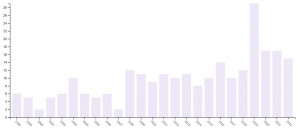This content has been archived. It may no longer be relevant
Outer space is quickly losing its „niche“ reputation in political science and international relations. When talking to colleagues there seems to be a greater awareness and appreciation of the importance of outer space for terrestrial global politics. This is also reflected in publication trends, as the figure below indicates.

It shows the number of publications containing the string „outer space“ from the Social Sciences Citation Index, specifically from the Political Sciences, International Relations, and Interdisciplinary Social Sciences categories. While 2019 was a bit of an outlier, there is still a clear increase in the number of publications over this 25-year window. (What we are (yet) missing are publications in the most high-impact journals – the American Political Science Review, International Organization, and the like publish very few space-related articles.)
What drives this rising disciplinary interest in outer space? For one, satellite infrastructures are – besides undersea cables, another issue that was overlooked for too long – the backbone of the communications revolution. Without satellites, globalization as we know it would not have been possible. In addition, there is the emergence of what we may call, for want of a better word, a „space race 2.0“ where major space powers are competing through prestige projects. Finally, there are discussions about debris-creating Anti-Satellite Weapons tests spurred by Indian (2019) and Russian (2021) live tests.
These issues also feature my own work agenda. After the interdisciplinary Commons in Space conference I participated in last week, I will attend (if only virtually) the Eleventh EU Non-proliferation and Disarmament Conference, which features a panel on responsible behavior in outer space. And I’m also co-organizing a series of one-day workshops on the „New Space Age“ at the Schader Foundation in Darmstadt, which will take place over 2023. Expect more news as this develops – just follow this blog.
3 Comments
[…] the Peace Research Institute Frankfurt (PRIF/HSFK). There, I will mainly contribute my expertise on space security and emerging technologies to expand the Department’s growing profile at the intersection of […]
[…] We compared governing regimes for five commons: the high seas, the deep seabed, the atmosphere, outer space, and the poles. Our finding was that the two „classical“ modes of governing these […]
[…] political relevance of outer space is growing – this is not limited to the current governing coalition but was also evident in the previous […]